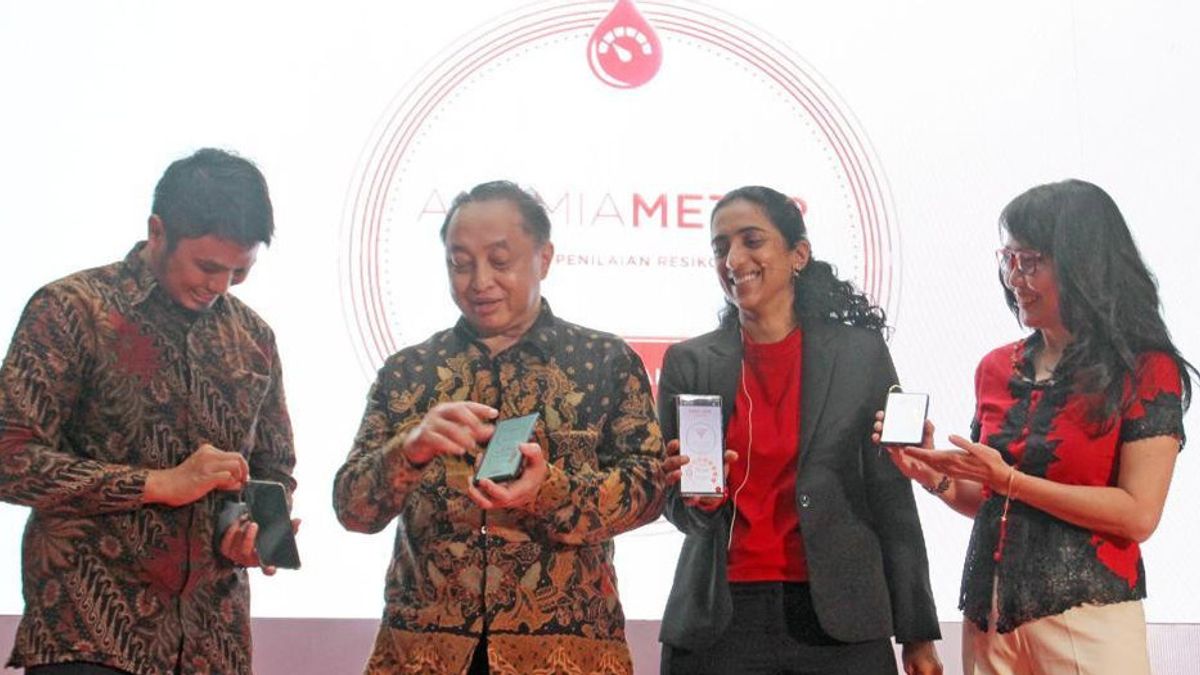JAKARTA - Based on the results of the Basic Health Research Report (Riskesdas), the prevalence of anemia increased from 21.7 percent (2013) to 23.7 percent (2018) of the total population in Indonesia. In 2018, 3 out of 10 Indonesian teenagers suffered from anemia6, and 62.6 percent of cases of anemia occurred due to iron deficiency.
Anemia or lack of iron has symptoms such as fatigue, lack of energy, pale skin, hair loss, shortness of breath, and irregular heart rate and often misinterpreted by sufferers, so it is important to detect the risk of anemia with iron deficiency to remain productive and prevent complications.
In the framework of the 2022 Iron Infectious Day, P&G Health Indonesia through the Sangobion brand, continues its education on the importance of detecting the risk of anemia with iron deficiency by launching the campaign "Don't Be Cuek, Let's Check Blood Lack Symptoms", and the latest breakthrough, ANEMIAMETER, Indonesia's first web-based digital application for risk detection of iron-deficient anemia. This activity is supported by the Indonesian Ministry of Health and the Indonesian Blood Transfusion & Hematology Association (PHTDI).
General Manager of Personal Healthcare, P&G Health Indonesia, Maithreyi Jagannathan said, P&G Health through the Sangobion brand is always committed to educating and improving the understanding of the Indonesian people about the importance of iron for blood health, for more than 2 decades. Around the world, November 26 is celebrated as the Day of Lack of Iron.
And as part of P&G Health's efforts to support the Indonesian Government to increase public understanding of the Infectious Iron and Iron Infectious Anemia, it launched the campaign "Don't Be Cuek, Let's Check Blood Lack Symptoms" and introduce the first web-based digital application in Indonesia, ANEMIAMETER, to detect the risk of iron-deficient anemia, through a variety of community education activities and health practitioners.
"This series of activities also supports government programs, namely CERDIK and GERMAS, which emphasize the importance of a healthy lifestyle and health checks to get to a healthier Indonesia," he said in Jakarta, Wednesday, November 30.
Head of the Community Empowerment and Mobilization Working Team, Ministry of Health of the Republic of Indonesia, Dwi Adi Maryandi, SKM, MPH said, anemia is still one of the health problems that the government is focusing on today. In Indonesia, the prevalence of anemia is 48.9 percent in pregnant women and 38.5 percent in children under 5 years. Even higher in adolescents aged 12-18 years.
Anemia can be caused by many things, and one of the most common causes is iron deficiency. The government has recommended several anemia prevention and control efforts carried out by providing sufficient iron intake into the body to increase hemoglobin.
"The public is also advised to eat balanced nutritional foods, as well as to consume TTD for adolescents and pregnant women. The Indonesian Ministry of Health also encourages a nutritious action movement in seeking to consume TTD to be a part of the school, especially junior high and high school students or equivalent," explained Dwi.
Dwi continued, in addition to some of the above efforts, his party also encouraged the public to routinely carry out health checks.
"Regarding anemia, we appreciate the P&G Health initiative for its continuous commitment to increasing public awareness about the importance of detecting the risk of anemia symptoms," he added.
Meanwhile, Chairman of the Indonesian Blood Hematology & Transfusion Association (PHTDI), Djumhana Atmakusuma, explained that lack of blood or anemia is a condition when the number of red blood cells and hemoglobin levels decrease. One type of anemia is anemia with iron deficiency that can affect anyone, but children, parents, and women with reproductive age who experience menstruation and pregnancy are among the most vulnerable groups.
"body conditions such as pregnancy, bleeding, excessive menstruation, hemoroidism, and gastritis can also cause the body to experience iron deficiency and if not overcome can become an anemia for iron deficiency," said Djumhana.
Djumhana added that iron deficiency can limit the delivery of oxygen to cells, resulting in frequent fatigue, unproductiveness, and decreased body immunity. Therefore, maintaining the balance of iron in the body is very important for health, as a way to overcome fatigue and anemia.
"Management with the provision of iron supplements is also important to give as symptomatic therapy if the diagnosis of anemia with iron deficiency has been enforced. However, it is still necessary to find and overcome the cause of anemia itself," he concluded.
The English, Chinese, Japanese, Arabic, and French versions are automatically generated by the AI. So there may still be inaccuracies in translating, please always see Indonesian as our main language. (system supported by DigitalSiber.id)













